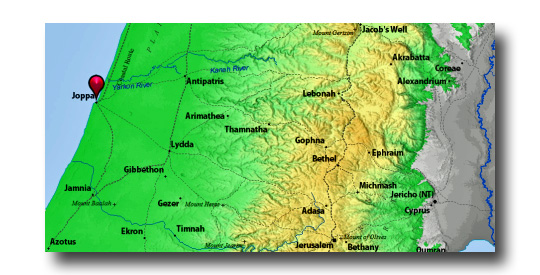 When we think of biblical locations associated with gospel outreach to the Gentiles, we may well think first to Jerusalem, where Peter’s preaching at Pentecost was heard by people of many nations in their own languages (Acts 2), and where the Jerusalem Council determined that non-Jewish converts would not need to be circumcised to be Christianly “kosher” (Acts 15). Or perhaps we might turn to Paul’s Macedonian call, which came to him in western “Turkey,” whereby the Lord led him for the first time into Gentile “Europe.” Or maybe to Antioch, described as a multi-ethnic, missionary-sending church in Acts 11 and 13.
When we think of biblical locations associated with gospel outreach to the Gentiles, we may well think first to Jerusalem, where Peter’s preaching at Pentecost was heard by people of many nations in their own languages (Acts 2), and where the Jerusalem Council determined that non-Jewish converts would not need to be circumcised to be Christianly “kosher” (Acts 15). Or perhaps we might turn to Paul’s Macedonian call, which came to him in western “Turkey,” whereby the Lord led him for the first time into Gentile “Europe.” Or maybe to Antioch, described as a multi-ethnic, missionary-sending church in Acts 11 and 13.
But, as I was just reminded by a colleague on a recent trip to Israel, Jaffa is front and center in this connection, the site of two events which revealed God’s love for all the world. As our tour group watched the sun set over the Mediterranean from the vantage point of this beautiful port city just south of Tel Aviv, Ray Van Neste of Union University reminded us that it was here Jonah defied God’s call to missions and Peter argued with God over the status of Gentiles.
First, let’s remember Jonah. When God told him to go preach to the Ninevites in Mesopotamia (northern Iraq), he headed the other direction, booking passage on a boat sailing out of Joppa (now Jaffa). The location of “Tarshish,” to which he was headed (Jonah 1:3) is unclear. Some say it was in southern Spain; others identify it with Carthage in northern Africa; still others connect it with Tarsus, in southern Turkey. Whichever it might be, it was definitely in the wrong direction. Jonah thought he could run away from God’s commission to preach warning to a Gentile city, but God set things right with a horrendous storm and a mighty fish.
When Jonah finally made his way to Nineveh and proclaimed God’s message of impending judgment, the people repented. So God lifted his punishment, and it upset Jonah. He admitted that the prospect of deliverance for these Gentiles was the reason he’d run to Joppa: “That is why I made haste to flee to Tarshish; for I knew that you are a gracious God and merciful, slow to anger and abounding in steadfast love, and relenting from disaster” (Jonah 4:2b). Fortunately, God, and not Jonah, was setting the spiritual agenda, and Jonah’s Joppa strategy did not prevail.
Now, for Peter. He, too, was cranky about the Gentiles, skeptical of their place in God’s gracious plan of salvation. We find him in Joppa at the end of Acts 9. He came there in response to pleas from believers who had lost a dear saint, Dorcas. With apostolic power, he raised her from the dead, and then chose to stay for a while in the town, at the home of Simon, a tanner.
While Peter was in Joppa, an angel of the Lord appeared to a Roman military officer in Caesarea, a little over 30 miles up the coast. He told the officer, named Cornelius, to invite Peter to his house to explain the gospel. As messengers were on the way to Joppa, Peter had his own special revelation from God. The Lord presented him with a variety of animals not suitable for food by Old Testament standards, and then told him to kill and eat them. Peter reeled at the thought of consuming, for instance, a reptile, and he objected. God rebuked him, declaring that he had no right to call anything “unclean” which He had cleared.
As soon as Cornelius’s servants appeared, Peter began to grasp the application, and he travelled with them to Caesarea, where he happily told the good news of Christ to an “unclean” Gentile. It had dawned on him “that God shows no partiality, but in every nation anyone who fears him and does what is right is acceptable to him” (Acts 10:34-35).
The lesson is clear: If you have reservations about extending the gospel to all the people on earth, you had better not go to Jaffa. God will find you there and proceed to set your mind right . . . perhaps with the use of supernatural animals, whether in the sky or sea.